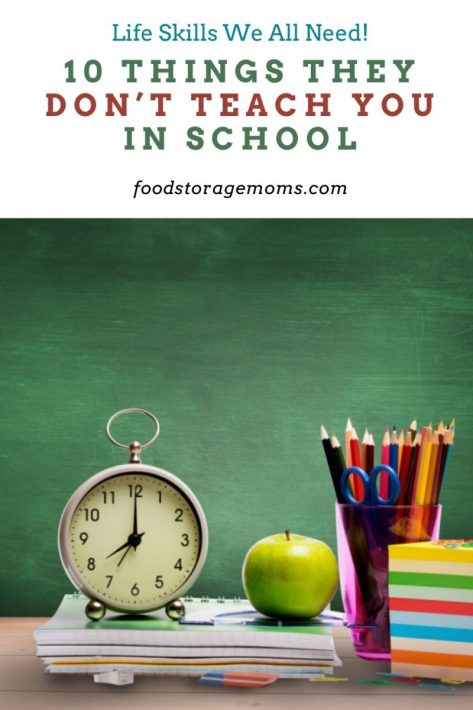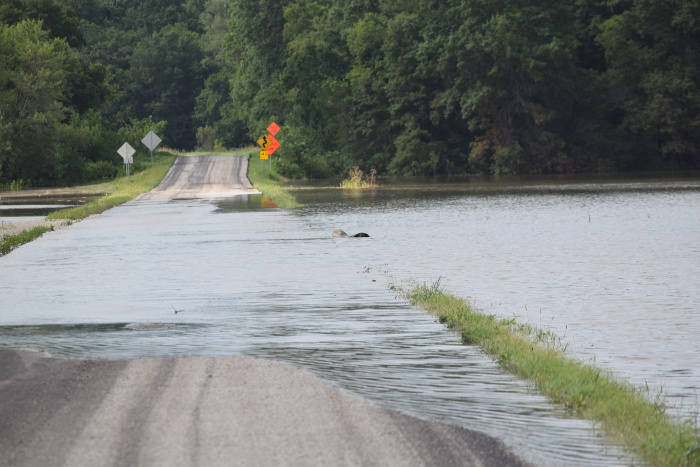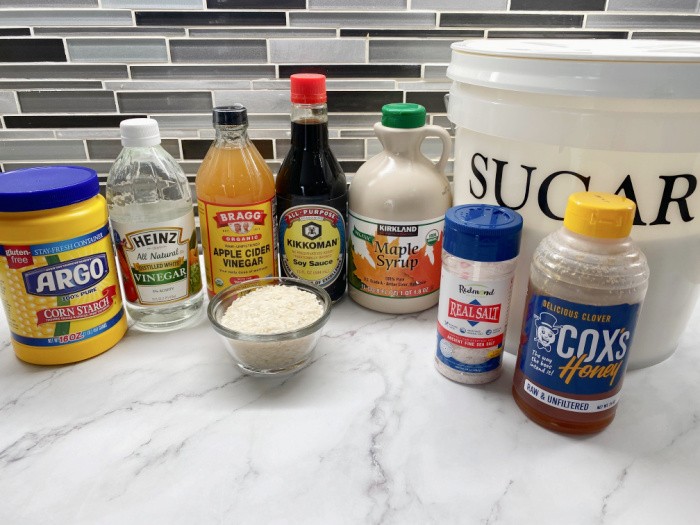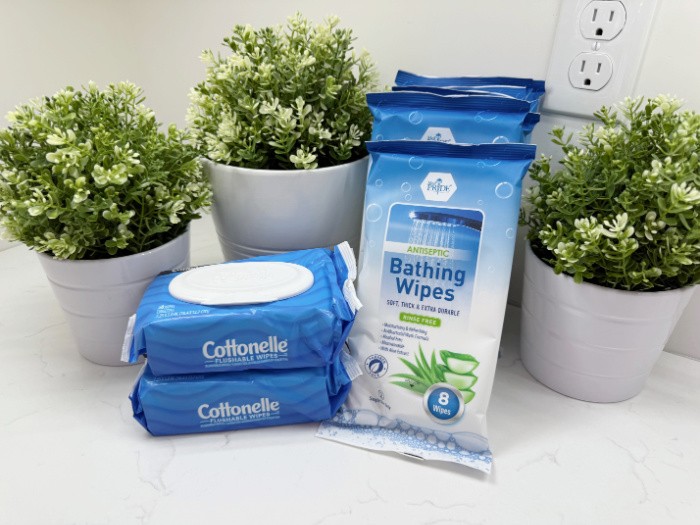10 Things They Don’t Teach You in School
These are at least 10 things they don’t teach you in school that they probably should. Whichever public schooling you received when you were younger, you developed a grasp for math, English, science, art, music, and more while simultaneously learning to get along with others.
You probably even practiced emergency drills and learned a different language or two somewhere along the way. In case you missed this post, Homeschooling: Would It Work For Your Family?
Let’s be honest, though. There are many areas of instruction where the schools failed us when it comes to preparing us for adulthood. A few of us even had to find out the hard way and learn valuable and challenging life lessons on our own. Even if you’re now a full-grown adult, it’s never too late to learn some of those things.
It’s surprising how much our youth are “learning” from the Internet. The challenge is, not all information from online sources are accurate or paint a picture of life as we live it. Much of the information we read is filled with bias or doesn’t present true current facts or even historical reports as things happened. Add the influences of AI, and much of the valuable information that could help us with plans and decision-making is clouded.
Mark recently commented to me that if our dentist was trained to treat issues affecting the health of our teeth in the same manner he was trained to be a banker, we wouldn’t be going to him. Lets discuss some important things we need to know that aren’t taught in school.
10 Things They Don’t Teach You in School

1. Banking
I think it’s safe to say that most high schools and many colleges across the United States don’t have banking as any part of their curriculum, and that’s a darn shame. Think of all the grown adults today who would be better off if they had learned early on how to balance a bank statement, qualify for a car or home loan, and how best to use bank savings and certificates of deposit for a family emergency fund.
Many students have had to learn by making significant financial mistakes because not even their mom or dad took the time to teach them more about personal finances. These are basic banking practices that students and adults need to know how to do:
- Open a checking and savings account
- Understanding interest rates for both deposit accounts and loans and how compound interest works
- Avoiding withdrawal fees
- Filling out a deposit slip
- How money orders work
- Choosing the right bank/credit union
- Learn how to use credit cards to your advantage without getting into too much debt
- Spend less than you make
- If student loans are a good idea and how they work when it comes to paying back the debt
2. Creating a Budget Based on Income
Creating a budget based on income also involves banking, but it deserves a category of its own. Sadly, many adults don’t know how to set up a budget to track their spending and help them get their lives back on track.
Not only does a budget help people manage their money more efficiently, but it also helps them save more for their future. Here’s more info that may help you.
It may seem like a different issue, but learning how to budget your time and apply effective time management skills is vital. Students may feel pressure to set aside the time to study and fulfill school assignments, but the pressure to prioritize time in a work environment can mean the difference between a company being successful or not. That is particularly true when you become a manager and have to not only accomplish your own managerial tasks, but help organize staffing and tasks of subordinates.
3. Filling Out a Resume
Congratulations if you went to one of the few schools in the country that taught you how to write an attractive resume. Mine sure didn’t. A resume is about selling yourself and leaving an impression on businesses and a future boss who doesn’t want to let an opportunity like hiring you pass them by.
Here’s how to write a great resume even if your schooling neglected this critical early step of your adulthood development.
4. Preparing for a Job Interview
Another critical area is preparing for a job interview and knowing how to sell yourself. Again, most schools fail in this area, too. Interviewees need to understand how to:
- Do research ahead of time about the company and how their education and experience may be useful
- Dress appropriately
- Answering their questions correctly with helpful examples
- Asking follow-up questions about the position you’re applying for to show your general interest
5. Completing Your Taxes
It makes no sense why it’s not taught in schools today. After all, almost everyone has to pay their taxes when they grow up, and completing tax forms is part of the process. It can be pretty intimidating, even for those who have been filing them for years. There are online programs like TurboTax to assist people, but it would be great to already know the terminology, how to properly record possible deductions, how deductions and dependents play into tax calculations, and if you qualify for any tax credits.
Schools need to begin educating their students or at least briefly explaining the forms that they will need to complete their taxes, such as their W-4s, W-2s, 1098s for mortgage interest and property tax, 1099s for other income, 1099 NECs if they are self-employed, and other critical information.
6. Public Communications Skills
Most of us in high school took a speech or debate class, where we had to get up in front of the class and discuss or persuade the class about a particular topic. While the instructor may have provided some feedback, they probably didn’t cover all of the public speaking skills that you need to thrive in the workplace, church, civic clubs, and other places that require public speaking.
This also includes the need to communicate your ideas, needs, and challenges in the workplace with co-workers, supervisors, and customers.
For those of you who would like to advance those skills, these are a few examples that you may find helpful and help you deal with the anxiety of getting up and talking in front of others.
7. Posting Appropriately on Social Media
Schools, and especially parents, need to do a better job of discussing this subject with their students. After all, there are negative implications that usually follow when people post inappropriate information or pictures of themselves, whether they’re smoking, drinking, or doing something else that should remain private.
Unless someone steps in, these same students will grow up without respect for themselves or others. It’s my understanding that prospective employers look at social media outlets when determining if you are a “perfect fit” for a job that’s available. Sometimes, future employers may not like what they see on your social media platforms.
8. Writing a College Paper
There are undoubtedly English and writing classes in high school that try to prepare students for what will be expected of them in college. Yet most teachers emphasize how to write a good paper with the proper grammar instead of the things you shouldn’t include, like questionable subject matter.
For those of you who don’t know what sticks out like a sore thumb to college professors when grading your paper, here’s How Not To Write a College Paper.
9. Survival Skills
Unless you were in Boy Scouts or Girl Scouts, or a close relative took you camping when you were younger, there’s the real likelihood that your survival skills are limited. It’s sad to realize that you didn’t learn a minute of it from the classroom. Nobody knows when they need survival skills to get themselves and their family through a dangerous situation.
10. Finding Resources Following an Emergency
While most school systems do a good job teaching children and students about taking shelter during an emergency, how to effectively exit a building on fire, and practicing drills year after year, once they’re adults, they still don’t know where they can find resources to help them get through whatever emergency that they may face.
If they don’t have friends or family to assist them to help them get back on their feet, they may not know where to turn. Here are a few resources you can look into when a natural disaster or other types of emergency has occurred, or better yet, to prepare for before the event.
10 Things They Don’t Teach You in School
Related Topic: 30 Pioneer Skills We Cannot Lose
Final Word
These are 10 things that schools don’t teach that some of you (including me) would have benefited if we had learned them in the classroom. Buying a home, planning for retirement, and learning about investments are notable areas where instruction would have helped us. What other important areas do schools not teach that they ought to? I’d love to hear from you. May God this world, Linda.
Copyright Images: School Supplies Deposit photos_84446982_s-2019






















Hi Linda! Another great post from you. A lot of what we learned as children, aren’t taught at home either.
They also don’t teach nutrition or cooking or sewing. No Home Ec anymore. Children aren’t taught about money management anymore either. There are so many things lacking that our children aren’t taught. Too many children are impatient. They want what they want NOW.
Hi Deborah, I agree, so many things are not taught at school or at home. It’s really sad, so many people want stuff that do not know how to work either. Or want to work, crazy, I totally do not understand that. You and I were raised differently. Crazy times, Linda
It’s crazy that they don’t teach this stuff. I learned a lot of it from school. The rest through parenting. I’m a hard believer that it’s parenting that is where the majority of knowledge comes from.
College isn’t something I recommend to most anyway. Very few jobs will pay enough to cover the expenses. That is something I do show to not only my kids but others. Investing in a masters or two for a $35-50K job is just silly. You’ll not gain a worthy return. That’s real math.
Buying a home or car is definitely a parenting thing. You should be there, at least in the first, to guide them and doing so honestly without judgement or brutality. There too much money to be lost to just toss them out into it.
Hi Matt, you and I learned from school and from our parents. I used to think college was important. Not so much anymore. The cost is out of control for our kids and grandkids to pay to attend college. Buying a home and a car for the first time having parents there is a great idea. We need to teach our kids how interest rates, terms, etc. are. Plus we don’t want them to get taken advantage of, for sure. Life is good when we are great parents and grandparents. Stay safe, Linda
Under banking, should also include the pit falls of using a credit card. I use them to get the 1 to 5% they give me back, but since I got out of debt (except for house), I don’t use them unless I have the money to pay them off so I don’t have to pay interest on them.
Personally I wouldn’t mind classes on fire arms, as so many people are afraid of them. They can be our friends if propery handled, properly stored and properly used. I did not serve in Viet Nam, but while in the milatary during that time, I never saw a weapon that hurt or killed anyone, only the one that had control of it could cause injury or death. Personally I don’t believe in gun free zones as that is an invitation to the bad guys. Let anyone responsable enough carry one, even concealled. Note words responsable enough, as there are some peole I would not like to see them have a weapon, just like I would not like to see them driving. Won’t hurt my feelings if you remove this paragraph.
Hi Chester, I have to agree with you on teaching kids about credit cards. I need to go add that to my post, thank you for the reminder. I really wish they had taught classes on using a firearm when I was in high school. You make a great point on there are a lot of people we wish would not be able to drive a car. I totally agree with this! Great comment, thanks for sharing. Linda
I agree that it’s sad so many things are no longer taught in school. I had sewing and cooking, the boys had shop. We all had public speaking/ debate, even how to read maps. What I miss the most? Drivers Ed! Ask these crazy young drivers could certainly benefit from learning courtesy in driving!
Hi Robbie, WHAT? They don’t have Drivers ED, now??? Oh my gosh, I had not heard this. What will be dropped next??? Thank you for letting me! Great comment! Linda
The last I heard from the grandkids is that you have to pay an outside source for the driving lessons. They don’t have simulators or even classes that go over the driving rules or COURTESY anymore. I think it’s so sad that schools don’t help prepare children for “life”. Not all parents are able or willing to cope with that skillset.
If like me, you see a mother in a grocery store with two or three children being well behaved and respectful, you can bet those kids are home schooled!! I had my doubts, when my son and daughter-in-law first said they were planning on homeschooling, long before Covid19, now I am proud and grateful.
Linda, a great article, two reasons out of several for the condition of this country is, schools, collages and parents have failed, harsh truth? Yes, think about it !!!!!
Hi Hearl, I’m so glad you made this comment. I sometimes am so shocked by how people are raising their kids. I know there are so many wonderful parents out there. I’m talking about the kids I see at church (before Covid) and at grocery stores running around without anyone watching them. Literally unsupervised. The parents and grandparents think it’s so funny, it’s not. They are disrespectful, rude, and downright little twerps. I taught my kids to be reverent at church, respect other’s properties, pick up trash and place it in the trash containers. OH, and manners, what happened to “Please” and “Thank You”? I must be old-fashioned. I better get on my soapbox!! It is the harsh truth, you are so right. Linda
I soooo agree with everything you said here, Linda! Whenever I have my gkids, they know the rules and the manners… and abide by them!
Hi Robbie, I had 4 girls in 6 years and so they were very close in age. If we went to the grocery store their little hands were holding tight to that grocery cart (back then I didn’t realize how filthy those carts were-LOL). They knew the rules and they like your grandkids knew the rules and they better abide by them. Life is so much easier with respectful and obedient kids. I always say having dinner through a drive-through doesn’t teach manners at the dinner table. Linda
I think that the real issue is not what they teach and don’t teach in public schools now or for that matter, ever, is that public school (high school specifically) is really just a 4 year college prep period. All the courses seem to “set you up” for going on to college. As Matt said, not everyone should go to college. In fact, even college is not “job prepping”!! If you are going to be a teacher, yes but not if you are going into just about any other field.
I would LOVE to see High School as a 4 year course in how to navigate the world! 1) how to get a job 2) how to manage your money 3) what happens to all that money that is taken out of our paychecks!! etc.
I think also that High School should be divided into 2 parts – college prep and vocational prep. At the end of the 8th grade, kids should be tested for these two parts as well as having a frank and honest conversation with the kids and parents about what the kids want in the future. For example, if I had been asked what I wanted to do, it certainly would not have been going on to 4 more years of college after High School! So, I did have some vocational training after I graduated. Later, I decided – I DECIDED – that I wanted a college education and I paid for it for the most part on my own (had a little help from my parents but darned little!). I wanted the college education but in the end, it did very little in furthering my career. It didn’t hurt but didn’t help much either.
I have a grand niece who was all for “FREE” education beyond High School. I asked her how it would be paid – she replied by the government. I then asked her how/where the government got its money – she replied she didn’t know. I told her to ask her parents and grandparents!! Well, she went on to get her Pharmacy Tech training and got her first job. When she got her first paycheck, she was practically screaming on FB about all the money taken out of her earnings. I told her THAT is how the government gets its money!! Because schools don’t teach anything about money, she had no clue as to what to expect with that first paycheck.
Unfortunately, I believe there are a lot more than 10 things they don’t teach you in school: like how to save for retirement (beyond managing the money coming in); how to do your income taxes; the difference between a standard IRA and a ROTH IRA; and the list can go on and on.
Hi Leanne, oh I hear you on the FREE education. It’s called our tax dollars. I agree my list should be 50 or more items!! The hair on the back of my neck stands straight up when “they” talk about FREE education. Nothing is FREE. The first paycheck is a great story actually about your niece. Life is so interesting sometimes. Great comment! Linda
Linda, as usual I agree with what you and Matt both had to say on this subject, though I think adding common life skills (like used to happen in home ec classes) would be a good thing. I’d also like to see Civics restored as a means of teaching our young about the historic basis of our Republic, which is, ever so sadly, devolving into a Democracy. Perhaps most critically, I’d like to see Logic taught, so our young could learn how to THINK for themselves.
Hi Ray, I agree with you! We need to teach our kids to think for themselves!! We need to have real scenarios of life to role play and by example, they will get it if the parents are honest, have integrity, and treat others with respect. Life is sure different now. Linda
Matt, agreed wholeheartedly about college. Anymore it’s little more than advanced brainwashing for liberal agendas unless you are studying hard sciences (or perhaps medicine). Seems thinking for yourself is too hard a subject for schools to teach, possibly because the teachers didn’t learn how either.
Thank you Linda for another great article. I would like to address another side of the “please and thank you”. We have taught our children and grandchildren to be respectful of others and courteous. (I am in my late 60’s). When we went shopping or were out, we taught them to open doors for others or help when they saw a need. I was astonished how many older people did not say thank you and some even said that they can do that for themselves in a not so nice a manner. I know that not everyone is like that but this kind of attitude does not help when we try o teach our young people how to be courteous and have a decent attitude.
Hi Elisabeth, wow!! That really is sad. We are trying to teach our offspring how to be polite and gracious. I am just the opposite, if someone opens the door or whatever, I thank them and smile from ear to ear. I want to convey to them that I am indeed grateful for their kindness. All I can say is keep doing what you are doing. I think sometimes people were not taught to accept this sort of kindness. If that’s the case, shame on their parents. We will keep teaching ours the correct way. Way to go girl! Linda
Don’t even get me started on today’s college students who want to party thru 4 or 5 years of school, live in luxury student condos, rack up tens of thousands of student loans and then seem surprised that they have to pay it back…..duh! They want a free ride…….
Hi Chris, the thing I wonder if Biden is even aware of about student loans. Some students get housing money, daycare money, why should we taxpayers pay those loans off. Yeah, don’t get us started. No FREE ride! Linda
A recent article took the police in Rochester, NY to task for pepper spraying a 9 year old girl. MY question is WHO did such a poor job raising a 9 year old that the police had to be called in the FIRST place. I don’t buy the whole “it takes a vilage to raise a child” It takes two parents who give a shi**!
Hi Chris, I’m glad you mentioned this, I thought the very same thing when I saw that incident on the news. Good parents is the key. Amen. Linda
As a teacher for over 30 years–I can tell you, you are spot-on! So much school-work now is busy-work–or watered-down material–or, frankly, propaganda!– that really does nothing for the eventual functioning adult. There were a couple of science and social studies textbooks that I refused to use, because they were so bad (in fact I kept some 1940’s-era first grade science books that were going to be tossed, and used *them* throughout my first grade years, since they were so much superior to the glossy rubbish that was bought new!)
There *was* one new math program (no, not “new math” but a newly published one!) that was great–I believe it was Saxon Math, which I was lucky enough to teach not just in first grade, but third and fourth as well. I remember fourth grade included how to write a check (of course included with the writing of numbers in words!) Lots of drill for math facts, lots of real-world problem solving, lots of ways to sort, record, and read/understand real-life information. (A few teachers griped that there wasn’t enough to challenge more advanced students, but hey, there are plenty of ways to do that–and speed drills never hurt the advanced kid!) So there *is* hope–assuming the curriculum selection committee in your school has any sense. Don’t hold your breath, though. If you’re a parent, DO see if you can get involved so you can have input! If you haven’t got time to volunteer for committees, or run for school board, or volunteer in the classroom, or however else you can make that input, then write letters or make phone calls.
You know–I did see a major change in my teaching years. My first year, I had 30 first graders in my classroom, and I honestly did not feel overwhelmed–most of the students were reasonably mannerly and obedient. By the end of my first-grade years, though, the contrast was huge–the much smaller classes consisted of children who had NOT learned to take care of themselves, think for themselves, had far fewer social skills, had much shorter attention spans–sorry, I do blame TV, especially Sesame Street, for that! (Plus there was a huge increase in teacher-paperwork–nothing is ever replaced, just added on!) Limit TV and computer time; let children play “free” and undirected, hopefully with time outdoors; give them jobs and responsibilities, and make them earn some of the extras they’d like to have. Check out programs like 4-H–“It’s not just cows and cooking!”–there are projects in just about every topic you can imagine, right up to how to present yourself for interviews.
Hi Rhonda, when my 4 girls were younger we didn’t have a lot of money. We used the kitchen table for our projects. Looking back I was homeschooling them before I had ever heard of it. Yes, they all went to public school but they knew how to read before they entered kindergarten. We didn’t have money for pre-school so I was the preschool teacher. I made papers with spaces to fill in letters. _at, _it, my girls loved it. We got books from the library and we read books every single day. I taught them to read recipes, we only had one car so we rarely went anywhere. I’m so glad I had that time with them. I will say this, a retired teacher in my neighborhood said she would not recommend being a teacher these days. Why, because the parents have not taught the kids to be respectful, have manners, and the parents are hard to work with. WOW, I will never forget her talking about the reasons. Linda
Hi Linda, there are 5 things besides your list I would like to see returned to HS curriculums. 1) American Government, read the papers, and think back to the 2016 and 2020 elections, most voters do not understand how the government works, how the branches work to balance each other, how the voting system works, ( then how to apply it, and your duty to vote). They need to study the Constitution, the Bill of Rights, and Constitutional Amendments. Young people are woefully uneducated in the most vital area of citizenship! 2) History from Ancient, to European, to American. If we don’t learn about the past, we are doomed to repeat it’s errors over and over again. 3) Physical Education. The first course to be dropped, to save money, yet the most important to keeping the body healthy, avoiding obesity, and living an active lifestyle. 4) First Aid and CPR. 5) Health Education – covering all the basics of caring for the body, explaining the female cycles, STD’s and barrier protection and contraception, birth control, what to do if a relationship turns physically or emotionally abusive. How to relate to each other emotionally, respectfully, equally. And a good understanding of heterosexual, homosexual, and transgender identification with out stigma or bias. ( I know parents have objections, but they don’t have the background or a real understanding of how to discuss these with their children. So let them be taught objectively by a teacher who’s had special training and has experience. That way they.get the information they need, to tackle their young adult years, and plenty of opportunities to ask questions, and seek deeper understanding.) They can learn coping skins for stress, anxiety, and pain in these classes, that will serve them well. I agree with you around the financial training. Add how to properly use a cash machine and document what is deposited and withdrawn. I had a heck of a time teaching this to my Hubs. I took bookkeeping as an overload my Senior year, to learn all those things, the correct way. 6) I also agree Home Ec should be restored, I’ve taught a number of people, including Hubs, how to cook. I’ve lost track of how many people, including Hubs, I’ve taught how to properly do their laundry. Both in the college dorms, and in public laundromats. If you look like you know what your doing, people come over to ask advice or questions. I’ve taught many how to fold their laundry properly, again including Hubs (he came from a very dysfunctional family setting). I’ve even helped people figure out grocery shopping from meals, to lists, to the actual choosing of items. Like how to select produce, what the various cuts of meat are, and what kind of cooking they require. I answer tons of food questions on the Quora Forum, from all over the world! Meal planning, portion control, what the food groups are, and how to use them to balance a meal. And finally, everyone needs to know the basics of sewing, machine and hand wise, and how to repair clothing and such. 7) Instead of having as many free periods as possible to stay out of the high school, students need to pick courses that will improve their future lifestyle, and broaden their horizons. I desperately wanted to take Shop and Art in high school, but girls were not allowed to take shop, and college prep were not allowed to take Art. At least those double standards have changed. My Father taught me what he could about repairs and home maintenance, but I badly wanted some basic carpentry training, and some basic metal working. I’ve learned most of what I know from books. The school days seem to tend shorter and shorter, when students need more time and need more training on these basic skills they will need when they leave home. Another biggie out of Home Ec, is how to keep the house clean, and how to keep it looking tidy. Another thing they need to learn in HS is how to do real research, both online and in the library, 8)They will need to write many papers in College, and many documents in their working lives, so they need to learn to outline and build their paper from an outline They need to learn all the forms of referencing their sources, properly (foot noting) I also wish they would enable Spell Check and Grammar Check (or Grammarly), and learn to use a Thesaurus and a dictionary. They need to read and understand what they read. Finally, young people should learn in High School how to organize themselves and plan for classes, study, test prep, papers due and required reading, while fitting in their activities of daily life around school requirements. MA
Hi MaryAnn, I LOVE LOVE LOVE your comment! I totally agree with you on every single item you talked about. I always wished I could take shop and mechanics, nope not for girls. I always wondered why. I was too shy to speak up and ask why not? I could do it now 50 years later. I sure hope people who send their kids to public school or homeschool their kids that they reach beyond the books. It’s time for a change and it needs to happen NOW. Great comment, Linda
I would like to see Canning and other forms of preserving food taught in school. I wish my grandchildren had the choice of shop in school and drivers ed. like I had. But, oh well my girls are doing a good job of teaching them right, wrong, courtesy, respect and skills for survival. Money management pretty much comes early in life when you are poor or middle class.
Hi Esther Marie, wouldn’t that be nice to have the schools teach canning and preserving food????? I grew up poor so I learned very quickly how to budget money and to work. Linda
I didn’t read through all of the comments so my comment might have already been addressed.
I am not sure what our world will be like in 30-60 years but…
Let’s just say it is pretty much what is like now!! So, someone retiring in 30-60 years, will need to have well over 1-2 million dollars saved for retirement!! I have been talking to my grandkids about starting their retirement accounts as soon as they get their first paycheck!! I’m no financial wizard but I do know that the sooner you start saving for retirement, the more money you will have to live on!
Hi Leanne, I would do the same thing. We put Mark through college without grants or student loans. He worked two jobs and went to school full time. I remember when 401K’s came out, I told my kids and now grand kids if your company will contribute, do the required amount to get that bonus from the company. Compounding interest is awesome. Once they get a certain amount banks are offering 4-5% on their money market savings accounts. We haven’t had this in years. Great reminder, Linda
Young people buying their first home need to learn what an amortization schedule is and how to use it. We used one and paid our mortgage off in 5 years and saved over $100,000. in interest…. and I still have the proof. 50 years of using credit cards for the rewards without paying a penny in annual fees or interest netted us $43,000.00 tax-free. Buying the smallest house in the best school district, let us sell it for 3 times what we paid, 25 years later. Home remodeling, canning, gardening, all of this was learned the hard way…..And NOW Doordash is offering a PAYMENT plan for your food order…. (Picture me hitting myself in the head)
Hi Chris, paying your house off in 5 years was a blessing. I owned a mortgage company for almost 20 years and gave amortizations to all my clients. 20-15-10-year payoffs. You have to have a plan, now the houses are over a million dollars where I live, not sure even 10 payoff would work. But if they had those 2 & 3% loans they could. Out first home was $18,000.00 interest 7.75! LOL! We sold that house two years later for $36,000.00. It was a blessing. I love your idea in interest free money using you credit card to pay for things and earn cash back! I saw a commercial on the DoorDash to make payments, oh my gosh, don’t do it anyone. Great comment, Linda